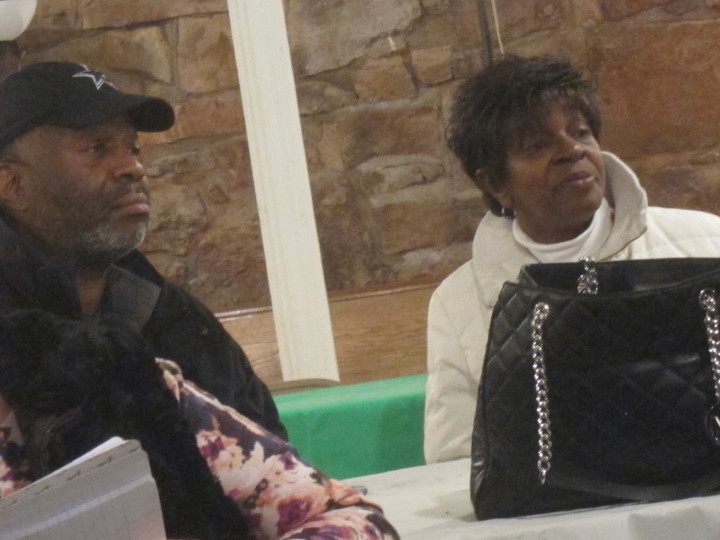
Allan Appel Photo
Davis: You asked for more stops …
Quinnipiac Meadows top cop Sgt. Roy Davis came to report news neighbors were looking for — a rise in motor vehicle stops in an area plagued by speeders.
That sparked a new set of questions about how cops make those stops, and of whom.
The discussion took place Tuesday night as Davis reported to a group of 25 members of the Quinnipiac East Management team gathered at St. James Church on East Grand Avenue that the district’s motor vehicle stops numbered 2,562 in 2016 compared to 1,717 in 2015.
“That’s 800 more traffic stops. You asked for it,” Davis said.
Davis was referencing the response he had received from neighbors when he originally asked their top priorities for his work in the neighborhood. They mentioned tackling traffic violations along with drugs and illegal dumping.
“Cops are starting to be a little more proactive,” he said.
That’s come about in part because Davis has a two-person community service cruiser dedicated to the sprawling district, which encompasses three aldermanic wards and runs like a long urban fairway from the North Haven border down through Morris Cove.
He has also deployed motorcycle units two mornings a week to make traffic stops generally near in what is perhaps the most car-centric corner of New Haven, a neighborhood that surrounds the busy intersection of Quinnipiac Avenue and Foxon Boulevard.
Statistics “show you’re getting more productivity out of your police officers,” he concluded.
While neighbors generally expressed both approval and gratitude, the subject was far from exhausted.

Team Co-Chairs Codiani and Curtis Kearney.
Several people, including management team Co-Chair Beatrice Codiani, asked if some bad news may be accompanying the good. She asked Davis if he is aware of any profiling going on — or “driving while black” concerns — amid the increased number of stops.
Davis said he’d heard of none. He said his officers are working diligently and professionally. “If there’s a serious problem, I’ll put them right in touch with internal affairs,” he added.
A member of the gathering countered Codiani by noting that many black and brown drivers live in the neighborhood.
“You’re asking for more traffic stops. It’s a difficult line,” Davis said.
He said his officers begin with verbal warnings, in effect giving drivers breaks.
Quinnipiac Avenue resident Gwen Burke challenged Davis: “How do you know when you’re being harassed?”
She then went on to describe how cops have stopped her 22-year-old grandson, who is black, three or four times in the past year without ever explaining why.
In the last instance Burke, who lives on upper Quinnipiac Avenue near the North Haven border, said her son was followed all the way from Meriden by a state policeman who stopped him only when he got home to New Haven.
“If it’s state police. why does my grandson get followed for miles and then stopped and not told why?” she asked.

Gwen Burke, rihg, at the meeting.
Davis said he could not speak for state troopers, who are trained in handling stops on the open road, not in community policing.
Nevertheless, he added, “They should be telling your grandson why he is being stopped.”
The other stops without explanation were conducted by New Haven officers, said Burke.
“You’re asking for more motor vehicle stops; it’s a difficult line,” Davis added.
Then he urged Burke to bring these concerns to his attention. Davis said he has no problem speaking frankly with his officers about the matter.
Burke said that her son gave her grandson “the talk” — about how as a young black male he must always keep his license and registration on the console of the car, easily in view of a stopping officers. That would avoid a need to reach into a glove compartment, a gesture that might trigger alarm or an overreaction by the officer.
She was asked by a reporter why her son did not ask for an explanation when stopped. She replied that part of the protocol of the “talk” is not to ask such questions, which might seem provocative.
The sense of harassment that emerged from the unexplained stops was creating in her grandson a sense of anger or rage, which ironically might make him unsafe, she said.
Most recently,an officer followed the grandson into one of the gas stations at the Quinnipiac Avenue and Foxon Boulevard intersection, then followed him out, and stopped him, without explanation only after several blocks. Burke reported that her grandson asked his uncle if he should get the officer’s badge number and follow up later.
She said they had a discussion about whether the grandson’s peering at the number might produce a bad result. The response to the grandson: “If an officer stops you, answer [questions] and don’t get smart.”
Burke said she wants her son to come to the management team meetings to meet officers and speak with them. But he works 12-hours days, she said, so he could not make Tuesday’s meeting.
When the discussion ended, Davis asked Burke if his answers, without getting too personal, had satisfied her.
“You did more than a lot of ‘em,” she answered.
“I’ll take that,” Davis said, “as a positive.”